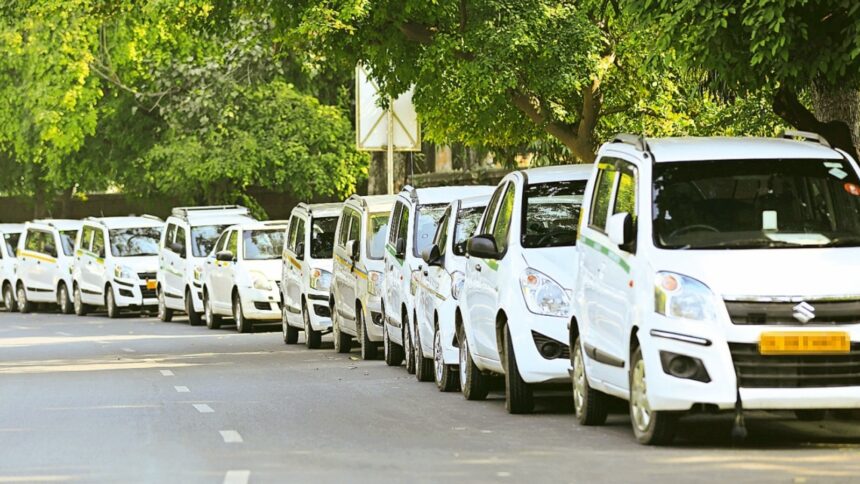Days after Goa government published draft guidelines to regulate app-based transport aggregators, taxi unions across the state have threatened to stage protests saying the move will pave the way for entry of private app-based taxi aggregators into the coastal state and threaten their livelihood.
The draft guidelines ‘Goa Transport Aggregator Guidelines, 2025’ outline a regulatory framework for app-based taxi and bike taxi operators — including licencing fee, tariffs and incentives.
For years, tourists visiting the state have complained that the privately-owned tourist taxis in Goa charge “extortionate” and “arbitrary” rates and fleece them.
According to the government, the draft guidelines published in the Official Gazette on May 20 will be taken into consideration on the expiry of 30 days from the date of publication in the Gazette. Any objection to the guidelines may be sent to the transport department during the interim period.
The guidelines state that an aggregator should on-board only drivers with a valid PSV (private service vehicle) badge and that they “shall not prevent or disincentivise the driver to on-board with multiple aggregators”. Additionally, an aggregator must ensure a health insurance for at least Rs 10 lakh with financial year 2025-26 as base year and an increment of 5 percent each year. For female drivers, the health insurance shall extend to their parents and children.
Crucially, the guidelines state that the aggregator shall “guarantee that the owner receives at least the fare as prescribed by the government for every journey completed by the passenger”.
“The aggregator shall not make any deductions whatsoever from the fare receivable by the owner… The aggregator shall ensure that all the payments to the owner are settled within 72 hours from the completion of the journey,” it adds.
The draft guidelines also list some incentives for aggregators from the government, including a 100 percent waiver of renewal fee if 20 percent of the fleet is driven by female drivers at the time of renewal and a full reimbursement of annual insurance premium paid or Rs 30,000 to the owner of a female driven vehicle that complete 500 trips on apps in a year.
Unlicenced operations or violation of licence conditions shall result in a penalty of Rs 50 lakh and blacklisting of the person or aggregator. A violation of fare regulations may result in a penalty of Rs 5 lakh for each instance.
According to tourists, the entry of app-based taxi aggregators would bring in competitive pricing, ensure considerably lower fares and help in regulating the taxi market, which is controlled by ‘powerful’ taxi unions. The local taxi unions have, however, opposed any such moves, saying the private app-based taxi operators would open the floodgates for “outsiders” from neighbouring states to come, resulting in job losses for local Goan drivers and taxi owners.
In 2018, the Goa Tourism Development Corporation launched a state government-backed app-based taxi service – GoaMiles – which was the state’s first app-based service.
A government official, requesting anonymity, said the draft guidelines will be refined “based on the suggestions that are received”.
“The guidelines are aimed at facilitating app-based convenience for locals and tourists, improving mobility and access to reliable taxi services and at the same time protecting the interests of local drivers,” he said.
But taxi unions have objected to it saying the private app-based taxi aggregators are more suited for metropolitan cities where the volume of traffic is high and proper infrastructure is available to integrate services.
“Goa has a small population and vehicle ownership per capita is high. Our jobs are dependent on tourists, especially in the coastal beach belt. For an app-based service, there will be no demand in the mining belt or hinterland areas. These app-based aggregators will flood the market with a large fleet and onboard drivers from other states and drive us out. The traditional businesses, whether shacks or taxis, must stay in the hands of locals,” Yogesh Govekar, a driver and a member of an umbrella union, the All Goa Tourist Taxi Owners Association, told .
“We will not allow these aggregators to come in. We will come out on the streets and protest. It is a question of our identity and livelihood,” he said.
Sunil Naik, President of the North and South Goa Taxi Owners Association, told the media: “These guidelines are not acceptable to us. They are not properly defined and create a perception that people from across the country will come here and start operating taxis. We are self-made people who have grown up and built our businesses. We are not going to give that all up and start working for a corporation”.
A spokesperson for Uber said: “We believe tourists as much as locals in Goa deserve more mobility choices, and there is already strong existing demand for reliable ride options in the state. This regulatory update makes it possible for platforms like Uber to serve that demand more effectively and responsibly. As we review the draft guidelines in detail, we will submit our formal comments and continue collaborating with all stakeholders to ensure the final framework delivers long-term value for riders, drivers, and Goa’s tourism-led economy”.








